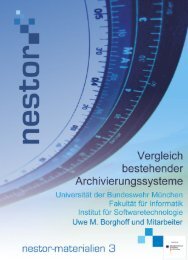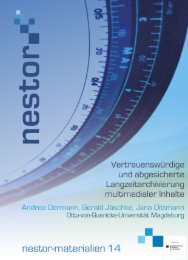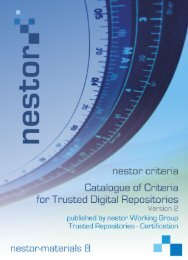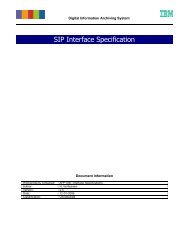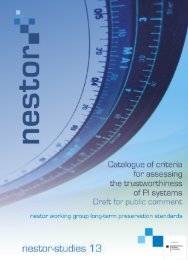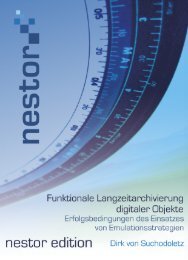actively pursuing the long-term preservation of its collections. In this respect, it differs fromthe majority of German repositories, many of which are, as outlined above, set up asplatforms focused primarily – and often exclusively – on (present) access. The approachtaken by pedocs is different in the sense that from its inception it was planned with anemphasis on the requirements of digital preservation, and thus its processes, policies, andstandards have been (and are being) developed to meet the requirements of long-termpreservation, which will be carried out in cooperation with the DNB. In consequence, longtermpreservation features did not have to be added to pedocs retrospectively, and thusadded “on top” of an existing and finished system so to speak, but were implemented rightfrom the beginning.The types of publications accepted by pedocs include monographs (in particular outof-printand digitized monographs), conference proceedings, essays, journal articles, preandpostprints, doctoral or habilitation theses, as well as gray literature. Currently, a greatnumber of the documents archived in pedocs are essays and articles published before1995 by authors who were able to secure the right to publish these works online beforethe 2008 change in German copyright law (the so-called “zweiter Korb”). However, thecollection of current publications is growing steadily.pedocs is funded by the German Research Foundation (DeutscheForschungsgemeinschaft, DFG) and is currently preparing to apply for DINI certification.pedocs SoftwareThe pedocs software is based on a strongly modified version of the German OPUSsoftware (version 3.1) 45 and runs on the common LAMP stack. 46 The decision to useOPUS was made on the one hand because it runs “out of the box.” On the other hand –and more importantly – however, it uses the same software components as the FachportalPädagogik so that the expertise required to run and maintain OPUS was readily availableat the DIPF. In addition, OPUS has a wide user community in Germany, and expectationswere at the point when the decision was made that future support and development of thesoftware were likely. 47 Early in the development of pedocs it became apparent, however,that the original OPUS, which was geared towards the storage and management of(doctoral) dissertations and strongly mirrored the institutional structure of Germanuniversities (e.g. it contained required fields such as university, institute, etc.), needed tobe adapted in order to make it useful for the objectives pursued by pedocs. In03.11.2009.45 See http://www.carpet-project.net/en/content/tools-and-services/carpet/opus-1/ for summary information(including an illustration of its architecture) about OPUS. Additional information is available athttp://elib.uni-stuttgart.de/opus/doku/dokumentation.php – 03.11.2009. Scholze and Summann 2009 givesa brief introduction to OPUS (note that the publication, although very recent, describes a previous OPUSversion). Winkler 2008 also presents information on the conception and architecture of the OPUSsoftware.46 I.e. Linux, Apache, MySQL, and PHP4.47 According ROAR, 34 out of 111 German repositories currently use OPUS, while according OpenDOARamong the 137 German repositories listed there, 52 use OPUS. See http://roar.eprints.org/ andhttp://www.opendoar.org/ – 01.11.2009. See http://www.driver-support.eu/national/germany.html for a shortoverview of the German repository landscape – 03.11.2009.20
consequence, for example, new document types were created, fields were added andrenamed. Further changes were and continue to be made in order to adapt the pedocssoftware to the requirements resulting from long-term preservation concerns.Expectations are that within two years from now the pedocs software will only beremotely related to the original OPUS base. The downside of the adaptations made to theOPUS software on which pedocs was originally based are that an update to subsequentversions of OPUS will not be possible as any changes made in the past would be lost. Inaddition, pedocs no longer partakes in the advantages of using a software with a wide(national) user community.pedocs-DNB cooperationAs mentioned above, pedocs is in the process of implementing a preservationworkflow in cooperation with the German National Library (DNB). Currently, an agreementis being drafted which will specify the details of the cooperation, the basis of which isamong others formed by the legal deposit regulation (Pflichtablieferungsverordnung,PflAV 48 ), the National Library Law 49 , as well as the DNB's collection guidelines. Thus,pedocs will be treated similarly to a publisher required to submit publications to the DNB;the DNB itself, on the other hand, is required by law to collect and preserve electronicpublications. 50 The cooperation agreement will have to specify, among others, the designof the Submission Information Packages provided by pedocs, how frequently these will beharvested by (or submitted to) the DNB, and at which points and in which form the DNBwill return migrated objects back to pedocs for re-ingest.2.1.2 JUWEL (JUelicher Wissenschaftliche Elektronische Literatur)JUWEL 51 is a service offered by the Central Library of the Forschungszentrum Jülich(Research Center Jülich), which was established as part of the Open Access strategyproposed in 2003 and since then implemented at the Forschungszentrum (FZ). 52 With keycompetencies in the field of physics, biophysics, and scientific computing, research at theForschungszentrum Jülich is also carried out in the areas of health (biotechnology,neuroscience), energy and environment, and information technologies of the future. 53Thus, the Central Library is a special library providing services to a very heterogeneoususer community, which makes both the monitoring of JUWEL's designated communitiesand the subject indexing of publications submitted to the repository a challenging task.48 http://bundesrecht.juris.de/pflav/index.html – 01.11.2009.49 http://bundesrecht.juris.de/dnbg/index.html – 01.11.2009.50 For the DNB's preservation strategies and principles, see Neuroth et al. 2009 (chapter 18.2) as well as theshort introduction to kopal given below.51 http://juwel.fz-juelich.de:8080/dspace/ – 03.11.200952 See http://www.fz-juelich.de/zb/index.php?index=758 (03.11.2009). for information on the FZ's OpenAccess strategy which is also outlined in a 2003 lectured delivered by the then director of the FZ's centrallibrary, Dr. Rafael Ball (see Ball 2003).53 See http://www.fz-juelich.de/portal/research – 03.11.200921
- Page 6: AbstractTaking its cue from the inc
- Page 13: and benefit from the development an
- Page 18 and 19: German repositories have already be
- Page 20 and 21: [t]he Open Archival Information Sys
- Page 22 and 23: Thus it seems highly recommendable
- Page 26 and 27: Like pedocs, the repository is not
- Page 28 and 29: application for a project grant was
- Page 30 and 31: generating an Archival Information
- Page 32 and 33: Integrity can be defined as “comp
- Page 34 and 35: It is with this step that the metad
- Page 36 and 37: documents submitted to the reposito
- Page 38 and 39: [t]he majority of OCR software supp
- Page 40 and 41: One of the shortcomings of the soft
- Page 42 and 43: set of shared metadata which is the
- Page 44 and 45: document, and that hence the docume
- Page 46: Structural metadata: In DSpace it i
- Page 49 and 50: dc.description.provenancedc.descrip
- Page 51 and 52: Für die Langzeitverfügbarkeit der
- Page 53 and 54: ecord for a title; although a workf
- Page 55 and 56: Source (where applicable)Publicatio
- Page 57 and 58: checksums. In particular, TRAC requ
- Page 59 and 60: checksums are currently not checked
- Page 61 and 62: 2.4.2 JUWEL Data ManagementThe stru
- Page 63 and 64: Before any SIPs are accepted, the r
- Page 65 and 66: guarantee that documents are “arc
- Page 67 and 68: pedocs is a scholarly open access d
- Page 69 and 70: formats. 151 Although the possible
- Page 71 and 72: While the preferred file format is
- Page 73 and 74: from nestor criterion 8, making it
- Page 75 and 76:
preserved for the long term, will h
- Page 77 and 78:
It seems that of all three reposito
- Page 79 and 80:
associated with them, or has define
- Page 81 and 82:
versioning functionality which allo
- Page 83 and 84:
communication channels, responsibil
- Page 85 and 86:
Works CitedAllinson, Julie (2006):
- Page 87 and 88:
DSpace Homepage. http://www.dspace.
- Page 89 and 90:
Lynch, Clifford A. (2000): Authenti
- Page 91 and 92:
in the EU. Amsterdam: Amsterdam Uni
- Page 93 and 94:
Ingestnestor TRAC DINIReceive Submi
- Page 95 and 96:
Archival Storagenestor TRAC DINIRec
- Page 97 and 98:
Archival Information Update10.4 Das
- Page 99 and 100:
Preservation PlanningnestorMonitor



